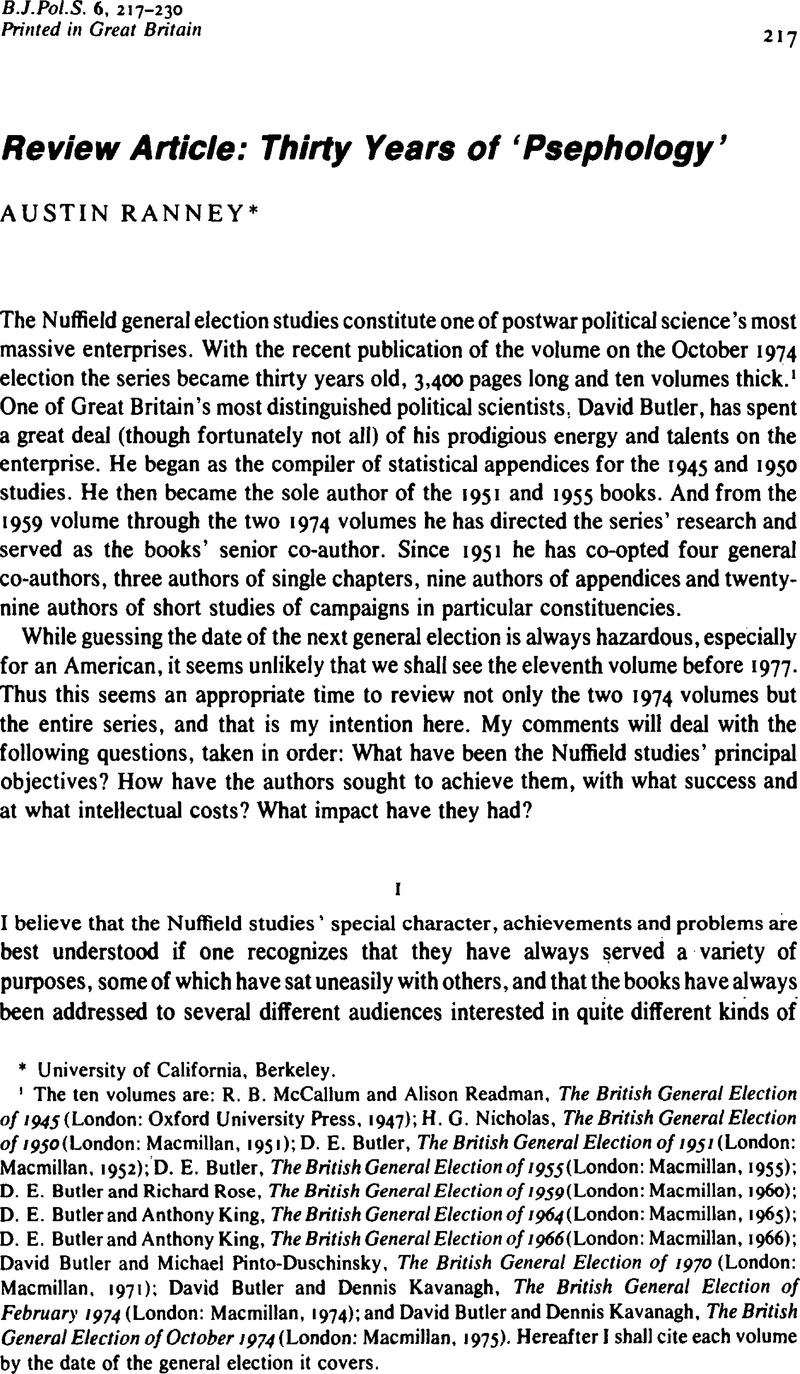Published online by Cambridge University Press: 27 January 2009

1 The ten volumes are: McCallum, R. B. and Readman, Alison, The British General Election of 1945 (London: Oxford University Press, 1947)Google Scholar; Nicholas, H. G., The British General Election of 1950 (London: Macmillan, 1951)Google Scholar; Butler, D. E., The British General Election of 1951 (London:Macmillan, 1952)Google Scholar; Butler, D. E., The British General Election of 1955 (London: Macmillan, 1955)Google Scholar; Butler, D. E. and Rose, Richard, The British General Election of 1955 (London: Macmillan, 1960)Google Scholar; Butler, D. E. and King, Anthony, The British General Election of 1964 (London: Macmillan, 1965)CrossRefGoogle Scholar; Butler, D. E. and King, Anthony, The British General Election of 1966 (London: Macmillan, 1966)CrossRefGoogle Scholar; Butler, David and Pinto-Duschinsky, Michael, The British General Election of 1970 (London: Macmillan, 1971)CrossRefGoogle Scholar; Butler, David and Kavanagh, Dennis, The British General Election of February 1974 (London: Macmillan, 1974)CrossRefGoogle Scholar; and Butler, David and Kavanagh, Dennis, The British General Election of October 1974 (London: Macmillan, 1975).CrossRefGoogle Scholar Hereafter I shall cite each volume by the date of the general election it covers.
2 1945, PP. xiv–xv.
3 1970, ix–x.
4 As is the case, for example, with Butler, D. E. and Freeman, J., British Political Facts, 1900–68 (London: Macmillan, 1969).Google Scholar
5 February 1974, pp. vii–viii.Google Scholar
6 Which sometimes has its aesthetic costs: the February 1974 volume is filled with horrendous typographical errors, by contrast with their remarkable absence in the earlier volumes.
7 In a footnote he explains that the word was coined by McCallum from the Greek word for the pebbles which the citizens of Periclean Athens dropped into an urn as their method of voting: 1951, p. 1, fn. 1.
8 1955. p. 1.
9 ‘Taking the Life Out of Polities’, Observer, 18 04 1971.Google Scholar
10 ‘Fallacies of Psephology’, New Society, 15 04 1971.Google Scholar
11 1955, pp. 2. 3.
12 Butler and Kavanagh say in the 1974 volumes that ‘a series publication lays on its authors an obligation to preserve continuity wherever possible’ (February 1974, p. vii)Google Scholar and that they are ‘constrained by the need to record the repeated routines of electioneering and to provide in standard form the factual information expected in one work in a series’. (October 1974, p. vii.)Google Scholar
13 1959. pp. 4–5.
14 1964, p. 4. This has since involved over three hundred interviews for each volume, almost all of them conducted by the authors.
15 Cf. White, Theodore H., The Making of the President, 1960 (New York: Atheneum, 1961)Google Scholar, and subsequent volumes for the 1964. 1968, and 1972 presidential nominations and elections.
16 1950. p. 106.
17 1966. p. 213. emphasis added.
18 The ‘apparent’ turnout is calculated by dividing the total number of votes cast by the number of registered voters; the ‘real’ turnout is calculated by estimating what the total number of. registered voters would have been if the register had been brought up to date just prior to the election.
19 This concept has become so closely associated with David Butler and the Nuffield studies that when Butler and Donald Stokes were casting about for a title for their volume on British voting behavior stressing the conditions of political change. Herbert Nicholas suggested over a glass of sherry that they call it Swinging Britain. Unfortunately, however, they settled for the good grey title Political Change in Britain.
20 1945. pp. 263–4.
21 1945, p. 277.
22 1950, pp. 328–9. The reference is to Kendall, M. G. and Stuart, A.. ‘Cubic Proportions in Election Results’. British Journal of Sociology, 1 (1950), p. 183.CrossRefGoogle Scholar
23 1955. pp. 203–4.
24 1955. pp. 204–5.
25 1959, p. 238.
26 In the 1950 book Butler had warned that the measure's utility depended upon how nearly the facts fit the assumption that the votes for the Liberals and other minor parties are drawn equally from both major parties: 1950, pp. 329–30, fn. 1.
27 1964. p. 338.
28 February 1974. pp. 313–14.Google Scholar
29 Most notably Polsby, Nelson W. and Wildavsky, Aaron B.. Presidential Elections (New York: Charles Scribner's Sons. 1964. 1968, 1972. 1976).Google Scholar
30 October 1974, p. 54.Google Scholar
31 1945, pp. 89–90.
32 1970, p. 442.
33 October 1974, pp. 293–329.Google Scholar
34 I am aware that the studies have contributed several of Britain's best-known election ‘pundits’, especially Butler himself for BBC television, King for BBC radio, and Rose, for The Times.Google Scholar Some observers, indeed, say one cannot understand either the nature or the impact of the books without paying full heed to this by-product. The point, while doubtless correct and significant, is peripheral to the central concern of this paper: the utility for and impact of the books on the scholarly study of electoral politics.
35 1951, p. 5.
36 Butler, David and Stokes, Donald, Political Change in Britain (London: Macmillan, 1969).Google Scholar
37 1945, pp. xiv–xv. The entire passage is quoted above.